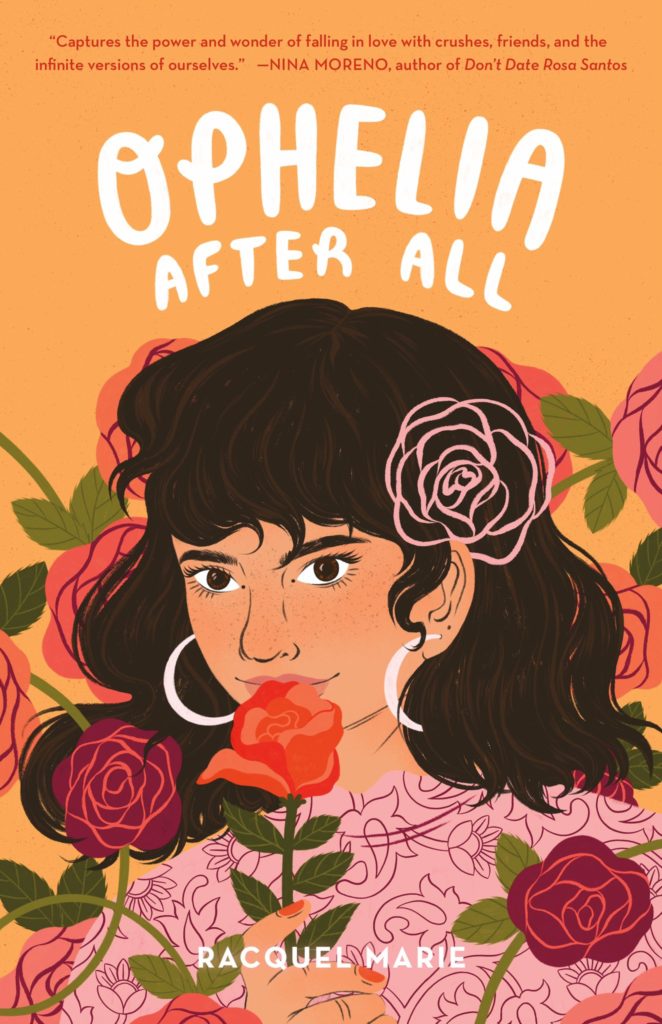
She is just like any other 17-year-old! She’s a pretty, witty, rose-gardening, prom-obsessed,
boy-loving girl. She’s Ophelia, after all! Or is she?
Racquel Marie’s debut YA novel follows Ophelia Rojas, a Cuban American teenager, through
her final weeks of high school. Everything goes according to plan… until it doesn’t. This
seemingly light-hearted coming-of-age story is packed full of personal doubt, queer
vulnerability, and commentary on racial identity struggles.
Throughout the novel, we see Ophelia Rojas come to terms with herself as a biracial Cuban
American living in California but primarily as a queer teenager. Despite being described as a
boy-crazy romantic by everyone who knows her, Ophelia’s “more than just friends” feelings
for classmate Talia force her to question everything that she thought she knew about herself.
This novel is a great read for its young adult audience. Marie does a considerable job of
capturing the feelings of a 17-year-old girl and all of the emotions that come with change as a
young adult. Although this book was thoroughly enjoyable to read, the lack of mature content
was slightly disappointing. Despite one reference to a pregnancy scare, there is little
discussion of sexual experimentation, which felt inadequate considering the novel’s
overarching theme of sexual orientation and queer relationships. Sexual exploration seems
necessary to truly display the reality of high school. This novel included discussions
surrounding sexual orientation, however, it lacked awkward sex scenes that most high
schoolers experience.
The internal struggle Ophelia faces as she begins to understand her queer identity is
beautifully realistic. Ophelia’s voice becomes familiar which builds the connection between
her and the reader. She is rediscovering her sexuality but is also forced to bear the weight of
expectations that her family has for her. Ophelia’s authentic narration lets the reader in on her
personal dilemma as she says, “I try to imagine Mom with a pride flag and Dad gifting me
punny shirts. But I don’t know what flag would represent me if I even deserve any of them.”
Ophelia’s confusion and frustration can be felt as she begins to accept herself for who she
really is.
Marie structures the novel so that humor and drama merge to establish a solid depiction of
high school. She makes a point to weave more serious topics into Ophelia’s 17-year-old
sarcastic voice, writing, “I don’t know why there are so few cars out on a Friday night, but I
don’t question it. Maybe everyone got the memo that Ophelia Rojas and Talia Sanches were
set loose tonight, breaking into houses and cursing out homophobic aunts.” Ophelia’s narration
does an excellent job of showing the reader her more sensitive side throughout the novel. She
lets us into her thoughts as she embraces the vulnerability of coming out, saying, “I have to
think about what I want now. Whatever that is” and “my brain is in charge right now, not my
heart or gut or ovaries.”
Bivisability and acceptance are key themes in this novel. Ophelia’s conversation with a friend
helps her realize that “likeing one girl and countless boys doesn’t make you less queer than if
it were half and half.” The way this novel opens the conversation about sexuality is
commendable, however, it was also a bit frustrating. Ophelia explains, “maybe I’m bisexual or
pansexual. Maybe I’m queer” but the reader is left unsure of her identity. Ophelia debates her
sexuality throughout the novel and by leaving it open, Marie doesn’t really give the reader the
answer that they are looking for. For young, especially queer, readers defining Opelia’s
sexuality would be more empowering and it was unsatisfying to see that this novel fell short in
that department.
Not only will the reader become invested in Ophelia’s life, but also in the lives and drama of
her many friends and classmates as they navigate their final weeks of high school. The book
ends wrapping up all of the story’s loose ends as Ophelia and her friends head to their much
anticipated senior prom, leaving the reader satisfied. This heartfelt story is worth the read.
This review was based on an uncorrected, advanced reading copy.
Emily Livingston is a Senior English Writing major at Loyola University New Orleans. She is
from Kansas City, Missouri and enjoys Romance and YA novels. She loves spending time
outdoors with a good book or playing any sport.
